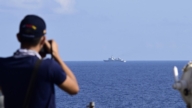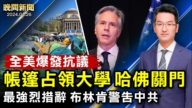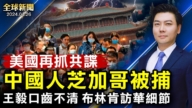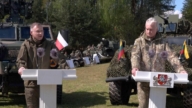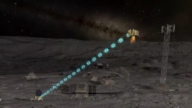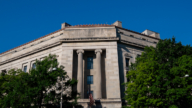【新唐人2014年02月11日訊】俄羅斯索契「冬季奧運會」日前開幕,這是蘇聯解體後,俄羅斯首次舉辦的奧運會,但是西方幾個大國領袖缺席了開幕式,而中共領導人習近平,和日本首相安倍晉三,卻高調出席,競相拉攏俄羅斯總統普京。本屆「冬奧會」檯面下的外交角力,似乎成為體育比賽之外的主要看點。
6號中午,習近平飛抵俄羅斯索契,這是中共最高領導人第一次出席由其他國家主辦的大型體育賽事。當天下午,習近平與普京舉行會晤,習近平向普京表示,中、俄是好夥伴、好鄰居、好朋友。
中國國際問題研究所歐亞研究部副主任李自國:「習近平接受採訪時已經表示了,鄰居在辦喜事,我要前來祝賀。另外,中、俄是一個戰略性的夥伴關係,這裡邊肯定是除了要參加奧運會之外,還有進一步強化中、俄戰略性關係的目地。」
台灣政治大學國際關係研究中心主任丁樹範:「美、中關係雖然彼此在盡量改善,可是美、中畢竟某種程度還是處於競爭的狀態,加上美、日安保,中國可能會認為,美國對它還是採取不太友好的一個態度。所以中國想要跟俄羅斯保持一些密切來往,來平衡一下美國以及美、日安全聯盟的關係吧。」
日本首相安倍晉三也在7號前往索契會見普京。這一次索契「冬奧會」,美國總統歐巴馬、英國首相卡麥隆、法國總統歐蘭德和德國總統高克,都沒有出席。安倍成為這次冬奧會上支持普京的主要國家領導人。
丁樹範:「西方本來是期待俄羅斯進入後冷戰以後,會有很大的改變,走向更開放,可是普京的做法很明顯跟西方的做法不一樣,所以有人把這次的冬季奧運會跟1980年夏季莫斯科奧運會來做個對比,也因此西方媒體對於這次冬季奧運、乃至於普京,呈現相當負面的報導。」
為營造友好氣氛,普京帶上了安倍兩年前贈送給他的那只日本秋田犬,在官邸門前迎接安倍的到來。普京還稱讚日、俄兩國的關係在迅速發展。安倍也表示,日本的導彈防禦系統不會針對俄羅斯。
據了解,今年6月4號,索契將舉行8國集團峰會,到時,普京和安倍還將再次會晤。而今年秋季,普京也將對日本進行正式訪問。
中、日兩國領導人競相拉攏普京,那麼,俄羅斯在其中扮演甚麼角色呢?
美國華盛頓特區的「美利堅大學」亞洲研究中心教授趙全勝,在《美國之音》《海峽論壇》節目中表示,習近平上任以來第一個出訪的國家就是俄羅斯,突顯了中共希望與俄羅斯加深關係,而安倍也希望在北方四島領土主權問題上取得突破。趙全勝表示,俄羅斯這個外交老手,當然希望左右逢源,藉機將國家的利益最大化。
丁樹範:「這一次在冬季奧運會,普京受到西方滿多的抵制,在這個時候,有習近平國家主席去訪問俄羅斯,參加冬季奧運會,普京心理上可能會感覺滿溫暖的吧,可是到底俄羅斯會不會賣中國所需要的Su- 35戰鬥機,這可能是另外一回事。」
俄羅斯副外長莫爾古洛夫,日前參加了在東京舉行的俄、日締結和平條約,和領土問題的有關談判。據了解,這是兩國領導人為了推動雙邊關係,所建立的新對話機制。
李自國:「俄、日之間有共同的利益訴求,那就是說經濟上有合作的訴求,但是呢,如果是參雜到領土的問題,這個合作就難以開展。這在過去的幾十年,已經非常明顯的表現出來了。」
不過,俄羅斯媒體和許多政治分析人士表示,考慮到俄羅斯對中共的戒心,以及俄、日兩國共同面臨的來自中共的威脅,俄、日雙方可以跳過領土問題,發展關係。
俄羅斯官員曾公開表示,絕不允許中國城在俄羅斯出現。相反的,日本福島發生核事故之後,俄羅斯一些政治人物甚至歡迎日本人移民定居遠東和西伯利亞。而一些經濟分析師也表示,在能源合作方面,俄羅斯大企業更願意吸引日本投資,並與日本組建合資企業。
採訪/常春 編輯/陳潔 後製/陳建銘
Sochi: China and Japan Compete to Win Support of Russia
The Sochi Winter Olympics is the first Olympic Games
that Russia has hosted since the demise of Soviet Union.
With major Western leaders absent, Chinese leader
Xi Jinping and Japanese Prime Minister Shinzo Abe
became the main support to Russia President Putin.
Diplomatic wrangling during this Winter Olympics
has become the focus outside of the sports arena.
On the noon of February 6, Xi Jinping arrived in Sochi.
This marks the first major international sports event
that the Communist regime leader has ever attended.
Xi Jinping met President Putin, and called Russia
a “good neighbor, good partner, and good friend.”
Li Ziguo, Deputy Director, Department for European-Central
Asian Studies, China Institute of International Studies:
“Xi Jinping has equated his visit to Russia for the Olympics
to that of congratulating a neighbor on a happy occasion.
In fact, China and Russia are strategic partners.
The visit to Sochi is definitely more
than one of friendships and Games.”
Arthur Ding, Director, Institute of International Relations,
National Chengchi University: “Even though US-China
relations are improving, they’re still in a state of competition.
With a US-Japan security alliance,
China still has doubt about the US.
China is hoping to balance its relationship with
the United States and the US-Japan alliance.
It seeks to do this through close contact with Russia.”
Japanese PM Shinzo Abe also visited Putin on February 7.
With the absence of U.S. President Barack Obama,
British PM David Cameron, French President Hollande
and German President Gauck, Abe became the main
national leader supporting Putin’s Winter Olympics.
Arthur Ding: “After the Cold War, the West had hoped for
Russia to undergo big changes, and become more open.
However, Putin’s approach has been
evidently to deviate from the West.
Many compared this Olympic Games
to the 1980 Moscow Olympics.
Even media have produced considerable
negative coverage of the Sochi Olympics.”
To welcome Abe, Putin brought his Akita Inu,
a pet gift from PM Shinzo Abe two years ago.
Putin praised the improvement in Russia and Japan relations.
Abe commented that Japan’s missile
defenses are not aimed against Russia.
It is understood that Abe will see Putin again at a summit
of the Group of Eight industrial powers in Sochi on June 4.
Putin will also pay an official visit to Japan later this year.
Both China and Japan are competing for
Putin’s support, but what role is Russia playing?
Zhao Quansheng, Director, Center for Asian
Studies, American University, Washington DC
commented on this issue to Voice of America.
Xi Jinping’s first official visit to Russia as a leader shows
the CCP’s desire to strengthen relationships with Russia.
Additionally, Abe also hopes to breakthrough on
the issue of the islands northeast of Hokkaido.
Zhao Quansheng further indicated that Russia,
a diplomatic veteran, is certainly hoping to grasp
opportunities to maximize interests for the country.
Arthur Ding: “Putin received high levels of boycotting
by major Western leaders during this Winter Olympics.
Putin certainly felt comforted by Xi Jinping’s visit.
However, does that mean Russia will sell the
Su-35 jet fighter to China? That’s a different matter.”
On a visit to Tokyo, Russian Deputy Foreign
Minister Igor Morgulov discussed signing
of a peace treaty between Russia and Japan.
Accordingly, this is an implementation
of agreements reached by the two sides.
This is to further develop
Russian-Japanese co-operation.
Li Ziguo: “There is a mutual demand between
Russia and Japan for this cooperation.
However, once a territory issue is involved,
the cooperation is harder to proceed with.
This has been obvious during the past few decades.”
However, considering the threat from China, Russian
media, and many political analysts, have reportedly
said that both Russia and Japan can bypass the
issue of territory, to develop relevant cooperation.
Russian officials have said publicly that a China
Town will never be allowed to appear in Russia.
In contrast, after Japan’s Fukushima nuclear accident,
some Russian politicians even welcomed Japanese
immigrants to settle in the Far East region and Siberia.
Some economic analysts also said that in terms of energy
co-operation, Russia’s big companies are more willing to
attract Japanese investment, and joint ventures with Japan.
Interview/ChangChun Edit/ChenJie Post-Production/Chen Jianming



